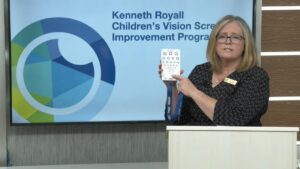Over the past year important services that regularly occur in our schools have largely been interrupted during the pandemic — such as management of health conditions, hearing and vision screenings, vaccination support and connecting students to services that work to eliminate health inequities. Vision screening is one of many services that meet critical needs of children. It is essential to eliminating poor vision and eye problems as a barrier to academic success and overall development. In addition to screening – eye exams, diagnosis, and treatment are vitally-important steps in the continuum of care. PBNC is fully prepared to assist schools with resuming and/or expanding their vision screening programs this year in order to ensure they can keep students healthy and learning in the classroom.
Endorsed by NC Department of Health and Human Services, PBNC’s Children’s Vision Screening Certification program aims to ensure that screenings are conducted in a consistent and uniform manner using evidence based and age-appropriate screening tools. PBNC will offer onsite and asynchronous virtual training options for school staff, volunteer vision screeners, and primary care providers so that they can conduct screenings in schools and as part of the well-child visit. The program certifies screeners in the fundamentals of vision screening techniques, referral, and follow-up. Participants will receive a manual, vision screening charts, and sample referral materials. Persons passing performance criteria and a written test receive a certificate which qualifies them to perform vision screening for a period of 2 years.
PBNC is committed to securing and advancing vision services for those who need them regardless of circumstance. All eligible students referred by PBNC trained screeners will continue to have access to vouchers for free eye exams and glasses. PBNC strives to raise the bar for children, providing the intervention they need at the right place and the right time, and helping to provide them with the ability to learn equally with their peers, to participate in school better, and to grow confidence in their education. These positive reinforcements can be attributed to good vision, correlate to better grades in school, and in turn a higher level of education, and ultimately a better career than if they had not repaired their vision at a young age.

